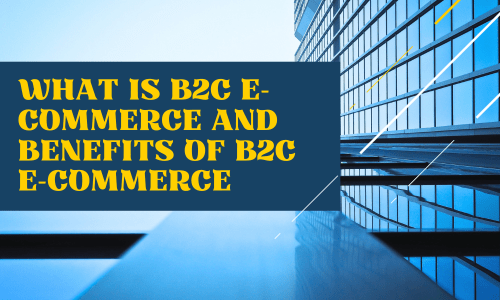What is B2C E-Commerce: In today’s digital age, shopping has evolved significantly from the days of crowded malls and physical storefronts. With the advent of the internet and technological advancements, the way we buy and sell goods has transformed dramatically.
One of the most prominent changes in the retail landscape is the rise of B2C e-commerce. In this blog post, we’ll explore what B2C e-commerce is, its significance in the modern world, and how it has revolutionized the way we shop.
What is B2C e-commerce?
B2C stands for “Business to Consumer,” and B2C ecommerce refers to the process of selling products or services directly from a business to individual consumers through online platforms. This means that when you shop online for clothing, electronics, groceries, or any other consumer goods, you are likely participating in a B2C ecommerce transaction.
Key Characteristics of B2C Ecommerce
- Wide Variety of Products: B2C ecommerce encompasses a vast range of products, from everyday essentials to luxury items. Online marketplaces like Amazon, eBay, and Walmart offer an extensive selection, making it easy for consumers to find what they need.
- Convenience: Perhaps the most significant advantage of B2C e-commerce is the convenience it offers. Shoppers can browse, compare, and purchase products from the comfort of their homes or on-the-go using mobile devices.
- Personalization: Many B2C ecommerce websites use data analytics and algorithms to personalize the shopping experience. They recommend products based on a shopper’s browsing and purchase history, making it easier to discover new items of interest.
- Easy Payment Options: B2C e-commerce platforms offer various payment methods, including credit/debit cards, digital wallets, and even “buy now, pay later” options, providing flexibility to consumers.
- 24/7 Accessibility: Unlike brick-and-mortar stores with fixed hours, B2C ecommerce operates around the clock. Shoppers can place orders at any time, which is especially convenient for those with busy schedules.
- Global Reach: B2C ecommerce allows businesses to reach a global audience. Shoppers can buy products from anywhere in the world, expanding their choices and potentially accessing exclusive or unique items.
- Customer Reviews and Ratings: Online shoppers often rely on customer reviews and ratings to make informed decisions. This transparency helps consumers gauge the quality and reliability of products and sellers.
- Easy Returns and Refunds: Many B2C e-commerce websites have streamlined the return and refund process, making it hassle-free for consumers to return items that don’t meet their expectations.
The Significance of B2C Ecommerce
B2C ecommerce has become an integral part of modern consumer culture for several reasons:
- Convenience and Accessibility: It offers unparalleled convenience and accessibility, allowing consumers to shop whenever and wherever they want.
- Product Variety: B2C ecommerce platforms provide an extensive selection of products, making it easier for consumers to find what they need.
- Competitive Pricing: Online competition often leads to competitive pricing, benefiting consumers by driving down prices.
- Empowering Small Businesses: B2C ecommerce levels the playing field for small and niche businesses, enabling them to compete with larger retailers on a global scale.
- Innovation: Ecommerce platforms are continually evolving, introducing new features and technologies such as augmented reality (AR) shopping experiences and voice-activated shopping.
Types of B2C Ecommerce Businesses
B2C ecommerce comes in various forms to cater to diverse consumer needs:
- Direct Sellers: These are online retail stores that sell products under their own brand or offer a variety of brands. Think of Zara’s online store, which exclusively sells products from the Zara brand, or Walmart, which offers a diverse range of brands on its platform.
- Online Intermediaries: Online intermediaries act as middlemen, connecting businesses and consumers. Etsy, for instance, allows individual sellers and small businesses to list and sell their products on the platform under their own brand names.
- Advertisement-Based: Some ecommerce sites focus on advertising products and services from other businesses rather than selling their own. Sites like The Huffington Post or The Guardian post ads for various products and services, generating revenue through advertising.
- Community-Based: In this model, businesses target online forums related to their products or services and market directly to potential customers. Social media platforms like Facebook host groups and communities where businesses can promote their offerings.
- Fee-Based: Fee-based ecommerce sites charge customers for accessing specific products or services directly on their platforms. Examples include subscription-based streaming services like Netflix and content platforms like Medium.
Benefits of B2C Ecommerce
B2C ecommerce offers several advantages over traditional brick-and-mortar stores:
- Expanded Reach: B2C ecommerce breaks geographical barriers, making your products accessible to a global audience. Anyone with an internet connection can potentially become your customer.
- Reduced Overhead Costs: Running a physical store involves significant overhead costs such as rent, utilities, and staff salaries. B2C ecommerce eliminates many of these expenses, allowing you to allocate resources more efficiently.
- Personalized Customer Profiles: E-commerce platforms enable businesses to collect data and create detailed customer profiles. This data-driven approach allows for tailored marketing and improved customer experiences.
- Convenience: B2C E-commerce provides unmatched convenience for consumers. They can shop 24/7, compare products easily, and have items delivered to their doorstep.
AT Bottom
B2C Ecommerce has transformed the way we shop, offering unparalleled convenience, choice, and accessibility. Whether you’re purchasing everyday essentials or indulging in a luxury item, B2C ecommerce provides a seamless and personalized shopping experience. As technology continues to advance, the world of online shopping will undoubtedly evolve, offering even more exciting possibilities for consumers. So, the next time you click “Add to Cart” on your favorite online store, remember the incredible journey that is B2C ecommerce.
